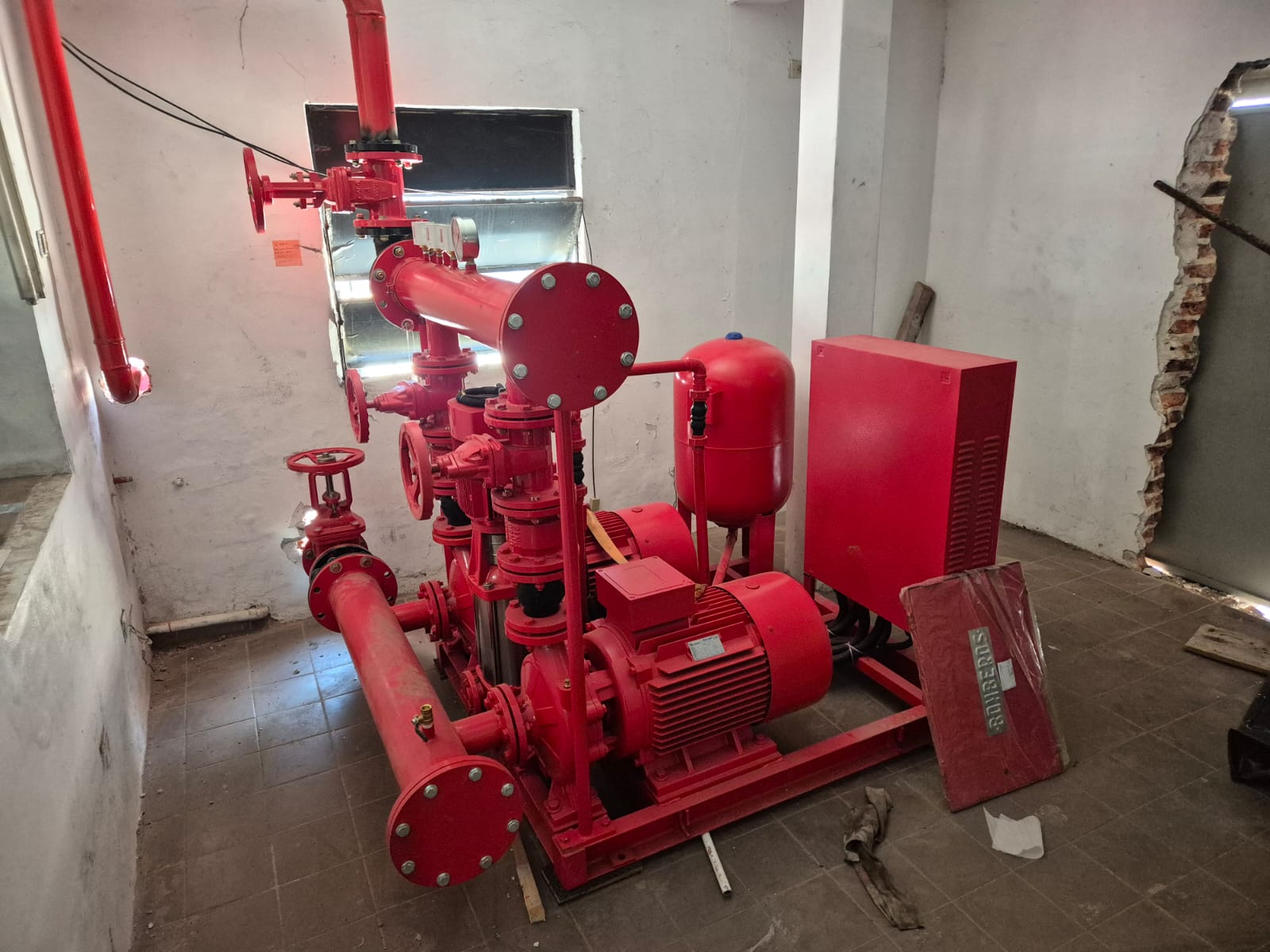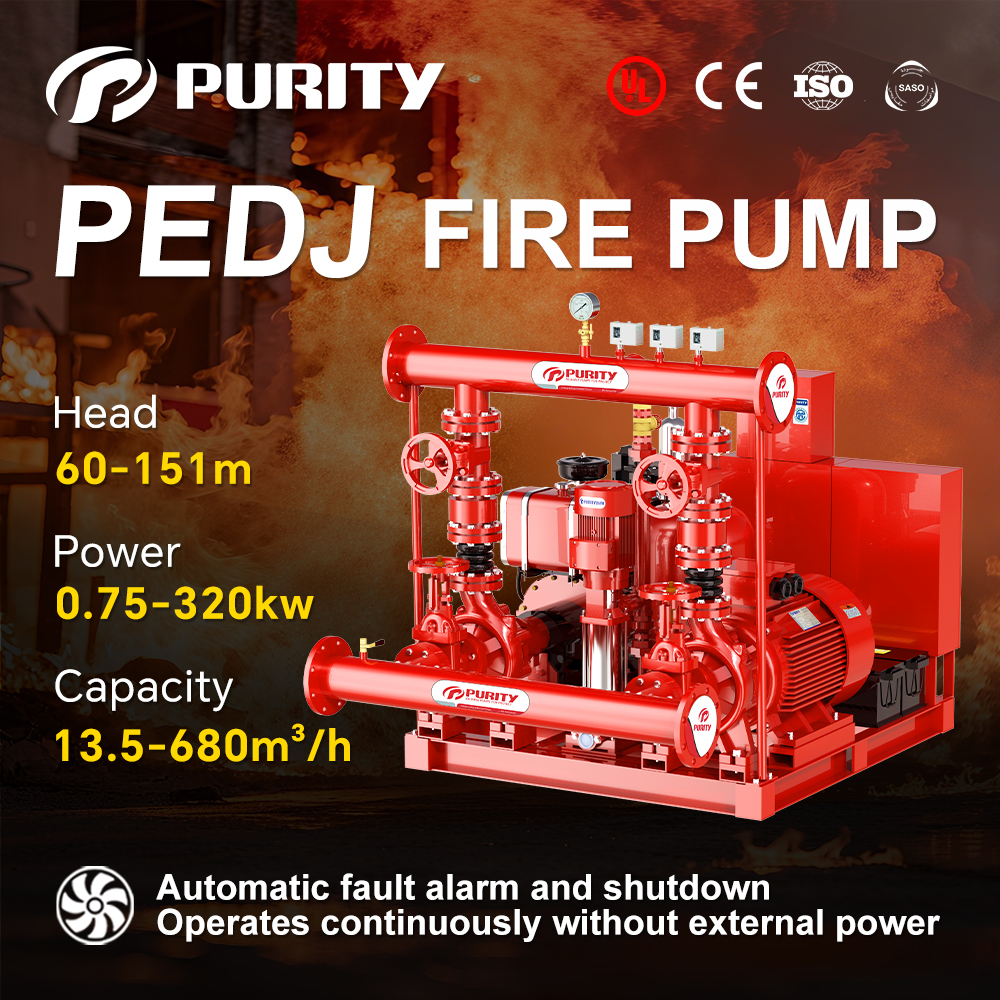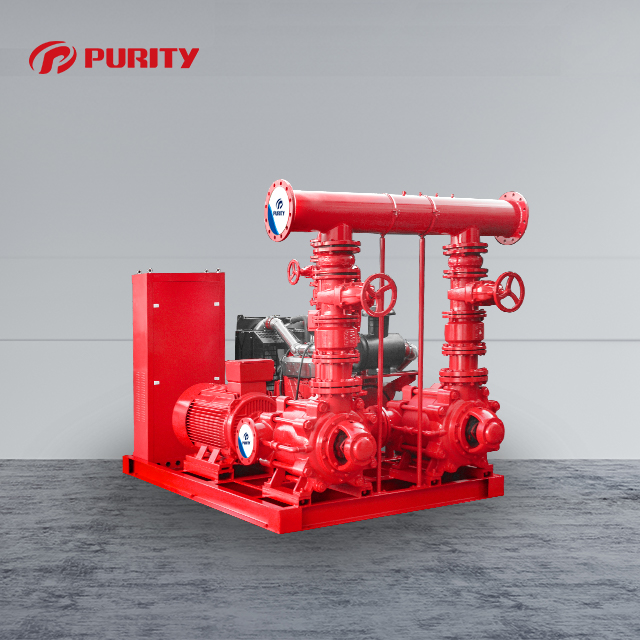In any modern fire pump system, reliability during an emergency is everything. When a fire breaks out, electrical power may fail, voltage can drop, and the water pressure from the municipal supply may not be enough to protect lives and property. In these critical moments, a diesel fire pump becomes an indispensable safeguard.
Unlike electric pumps, a diesel-driven fire fighting water pump operates independently of the power grid, ensuring that sprinkler systems and hydrants continue to function even during blackouts. This makes diesel pumps one of the most reliable and vital components in fire protection engineering.

Figure | Purity PEDJ diesel fire pump actual installation diagram
1. Importance and Core Function of Diesel Fire Pumps
A diesel fire pump is specifically designed to maintain the required water pressure and flow in a fire pump system, even when power is unavailable. By using a diesel engine as its power source, the pump can operate entirely independently from the electrical grid.
This independence provides a significant safety advantage, especially for industrial facilities, warehouses, remote installations, and areas prone to unstable power. When every second counts, a diesel fire pump ensures uninterrupted water delivery to sprinklers, hydrants, and hose reels, safeguarding both people and property.
Key advantages include:
(1)Independent power supply during power outages.
(2)High reliability and safety under emergency conditions.
(3)Powerful water delivery performance for critical fire-fighting operations.
2. Main Types of Diesel Fire Pumps
Leading fire pump manufacturers, such as Purity Pump, offer several types of diesel fire pumps to suit different fire protection applications:
(1)Centrifugal Diesel Fire Pump
This is the most common type used in modern fire pump systems. It uses an impeller to convert mechanical energy into water flow and pressure.
Advantages: High efficiency, large flow capacity, and wide adaptability.
Limitations: Sensitive to suction conditions; not ideal for water containing air or impurities.
(2)Multistage Diesel Fire Pump
This type features multiple impellers arranged in series to deliver higher discharge pressure.
Advantages: Excellent for high-rise buildings or long-distance water supply systems requiring high pressure.
Limitations: Higher cost and more complex maintenance.
(3)Fixed Diesel Fire Pump
A stationary installation designed for large-scale or municipal fire protection systems.
Advantages: Stable operation, strong water delivery, and long service life.
Limitations: Requires a dedicated pump room; higher installation cost.
3. Diesel vs. Electric Fire Pumps
Both diesel and electric pumps are widely used in fire pump systems, but each has distinct characteristics. Understanding their differences helps you select the most suitable system for your application.
| Comparison Criteria | Diesel Fire Pump | Electric Fire Pump |
| Power Source | Independent of electrical grid; functions during power outage | Requires constant power supply |
| Installation Space | Larger footprint; often installed outdoors or in a separate room | Compact and easy to install indoors |
| Initial Cost | Higher (requires fuel tank and exhaust system) | Lower installation cost |
| Operation & Maintenance | Regular inspection of engine, fuel, and cooling systems required | Easier maintenance; main cost is electricity |
| Service Life | Shorter if not properly maintained | Longer lifespan due to simpler design |
| Typical Applications | Warehouses, factories, remote areas, or sites with unstable electricity | Office buildings, apartments, and urban high-rises |
In short, diesel fire pumps are ideal when independence and reliability matter most, while electric fire pumps are better suited for stable urban environments.
4. Maintenance and Compliance Standards
No matter the type of fire fighting water pump, regular maintenance is essential to guarantee performance during an emergency. Routine checks should include engine oil, fuel, cooling systems, and periodic test runs to ensure readiness.
All diesel fire pumps should comply with recognized international standards:
NFPA 20: Standard for the Installation of Stationary Fire Pumps for Fire Protection.
UL and FM Certifications: Ensure that the pump meets global safety and performance requirements.
Routine inspection, lubrication, and operational testing help extend equipment life and maintain full functionality in case of emergency.
5. Why Choose Purity Diesel Fire Pump System (PEDJ Series)
As one of the professional fire pump manufacturers, Purity Pump has over 15 years of experience in the industrial and fire protection field, exporting products to more than 130 countries.
The Purity PEDJ diesel fire pump unit stands out for its intelligent design, strong reliability, and global compliance.
Key Advantages:
1.Uninterrupted Operation: The PEDJ diesel fire pump continues to run even during a power failure. The emergency start function ensures automatic switching to diesel mode when needed.
2.Smart Safety Control: Equipped with intelligent alarm and shutdown protection for overspeed, underspeed, low oil pressure, high oil pressure, and high engine temperature.
3.Certified Quality: Some PEDJ models have obtained UL certification, meeting international standards for safety and performance.
4.Trusted Expertise: With a 60,000 m² manufacturing base and an experienced R&D team, Purity provides complete fire protection pumping solutions for industrial and commercial use.
Purity is also actively seeking global distributors and partners to expand its international service network—making high-quality, energy-efficient fire pumps accessible worldwide.

Figure | Purity diesel fire pump PEDJ
6. Conclusion
A diesel fire pump plays a vital role in ensuring the continuous operation of a fire pump system, particularly where electrical reliability is uncertain or when high-pressure water supply is required. By selecting the right pump type, adhering to NFPA 20 and UL/FM standards, and performing regular maintenance, you can greatly enhance the reliability and responsiveness of your fire protection system.
In summary:
Use a diesel fire pump in power-unstable or remote areas, or when higher water pressure is needed.
Partner with experienced fire pump manufacturers like Purity for dependable performance, long-term efficiency, and professional service.
With the right fire fighting water pump in place, your fire protection system will deliver maximum reliability and safety—when it matters most.
Post time: Oct-16-2025



